Tuesday, November 15, 2005
Running A Country
LEGAL SYSTEM – IRAN
Because of a size concept, we normally forget that a country functions both internally and externally much the same way as does a corporation. In fact a country like Iran is just a huge company run by a distinctive management that initiated a hostile take-over and has had 25-years to run it. Instead of a Public or Customer Relations department, they have a Foreign Ministry, which here in the USA we call the State Department. The Sales and Marketing division is called the Ministry of Commerce and so on with Finance, Security, etc.
Just as with a commercial market place to which to offer their goods or services a country has to also develop commercial aspirations to earn an income on which to operate.
With good, competent management as opposed to inexperienced or hastily gathered supervision, the country or corporation prospers and deals with external and internal challenges adequately or poorly.
Just as when certain CEOs come aboard at ailing companies they manage to turn the situation they face around, chief executives can destroy their work place. As was the case in the management change in Iran from a Monarchy to a clerical oligarchy. Not always from their own lack of skills but because they cannot fill their management or employee needs to a sufficient depth.
In the corporate arena they generally answer to their Board of Directors and shareholders and hold the well being of their employees in their hands. With a country, the top positions of leadership answer to the cabinet and should theoretically answer to the people.
A quarter of a century ago, Iran had finally evolved under the last monarch, Shah Mohammad Reza Pahlavi from a mostly illiterate, minimally educated land into one where 80% could read and write and be termed literate but only a small percentage of the population had reached what would comfortably be called an “educated” status (specially politically), though millions were in school and tens of thousands were attending or had attended college or university. Many more were students overseas.
By then, 65% of the Iranians were under the age of 25 and were born with modern conveniences largely in place. Thus unable to remember when lives, including of their parents, did not have color television, did not have paved streets, were devoid of highways and piped water or electricity in homes were an exception instead of the rule so refrigerators required delivery of blocks of ice just prior to when they came into their world.
Primitive agriculture had grown into mechanized agro-industry and the legal and justice system of the country had wrenched itself away from purely religious tenets of law, like the Taliban in Afghanistan, to a combination of modern laws with a sufficient under-pinning of Koranic ideology to cater to the continued Islamic mind sets of the less advanced citizens.
We need to look back to pre-Mullah government by the Shah’s regime to define the present, one of a kind government that’s a hybrid they cobbled together and how it wields power and hides itself as a wolf in sheep’s clothing.
It had taken an almost equally tough “corporate” (so to speak) take over by the late Shah’s father to uproot the inept management of the previous Qajar dynasty personified by a teenage monarch living mostly in Paris and like Attaturk in Turkey to uproot clerical inroads and turn Iran into a more secular State. The “chador”, literally meaning a tent, head to toe cover for women was “officially” forbidden though any woman who chose to wear one was not subjected to any legal action or even official criticism.
Reza Shah, the father, then quite ruthlessly consolidated central government power which had dissipated into the hands of tribal chieftains, who ruled their fiefdoms with little regard to a wishy-washy central government. Something that the British and Europeans did not favor as it gave Soviet Russia too much leeway to interfere with Iran’s power structure. Reza Shah, who had commanded a Russian-Persian Cossack brigade, was acceptable to both the Russians and the British, who controlled most of the South of the country.
He eventually played one off the other to unify the country and took over the monarchy as a semi-educated but highly intelligent leader and political strategist. With a mind capable of conceptualizing how to disassemble a motor car engine and how it ran after having it explained only once and willing to be without much pity to fight rampant corruption, he laid the ground work for his son to take over. Making sure that education in Switzerland and military academy at St, Cyr prepared the young boy for his future duties.
What normally takes a revolution politically, to remove a tough dictatorial leader solidifying a country and central power structure, to replace him with a diplomat, happened when Reza Shah was forced to abdicate, or resign in corporate terms, and his son took over as the diplomat.
The new “CEO” of Iran discovered that his “corporation” had little or no standing in the global “market” and outside entities could control his manufacturing and production of his main export – thus revenue – oil. His focus turned to recovering the “ownership” of the country’s oil from foreign hands and to establish his “corporation” as a world entity.
To do this he had to be a consummate politician and he sometimes remarked that in dealing with intently opposed foreign powers such as the Soviets and Americans, he deserved an Oscar for his ability to act roles needed to keep them in check.
During the next 30-years, till the advent of the Ayatollahs, he single-handedly pushed Iran into the 20th Century – economically, industrially and politically despite a severe shortage of skilled managers and employees. Specially anyone who could be trusted or were educated enough. He had to draw on friends, relatives and later family members of his wife the Empress. Sadly discovering that most of these failed in their duties and even caused harm. At one point in time he was heard yelling at the Empress that he would not accept any more of her family in any government positions as they simply messed up or failed to act in the best interests of the country.
Politically, though formally a two party, bi-cameral constitutional monarchy, he ended up abolishing the existing two party, Iran Novin and Mardom structure and forming a single party, Rastakhiz, with a left and right wing component to it. With Iran Novin, headed by Prime Minister Hoveyda regularly winning a majority of every election and being in power for some 13-years, the loyal opposition Mardom party’s most competent people could never serve in important positions and this aggravated the lack of available high level talent.
Despite the tendency to dispute and block progress on purpose in the way evidenced in America by the Republicans and Democrats never arising, to avoid senseless bickering among a politically totally inexperienced nation the left wing/right wing concept became a necessary solution while he began to train his citizens to a higher political consciousness. By decreeing elections for the lowest rungs of the ladder – village headmen, to town or city mayors, county positions and some of those below the Provincial Governor, he insisted that everyone participate and become familiar with elective power by the people. Even though in practice there was only one party and he was a powerful father figure.
To illustrate how politically inexperienced or naïve the populace was at the time of his overthrow by Khomeini, a village consisting of 40 households, all related to each other, was unable to decide on electing a village headman and ended up writing to the provincial governor to appoint someone to that post as they were unable to vote and decide on anyone.
Apart from US President Carter’s personal animosity and direct action to remove the late Shah, the Shah’s efforts to modernize his country/corporation ran afoul of two major groups in Iran that had traditionally exercised financial and cultural control – the Bazaar and the Mullahs (clerics). When he moved the center of Commerce from Hajis in the Bazaar, who had a bath once a week and monopolized almost all imports and exports, except oil, out of “downtown” and into multinational industrial and commercial organizations and banking systems, they resented the loss of their economical stranglehold and began conspiring against the monarchy.
A conceptually similar resentment, though different opposition, can been seen in America with the CIA and the State Department actively verging on insubordination toward the Bush presidency until he had to appoint Porter Goss to head the CIA and place Condoleezza Rice in charge of the State Department to bring two very powerful government entities into line with his needs.
As millions of people became literate and certainly somewhat educated by Western standards and the absolute rule of the Koran, already weakened by the late Shah’s father was overshadowed and diluted by Western type of international or even family law, the power wielded by clerics also waned and caused them to resent loss of it. And with their closest allies the Bazaar merchants funding them, the Mullahs began using the Koran to undermine the Shah. Stating that God was a higher power than the Monarch (or CEO) and they as messengers of God had to be respected, feared and obeyed.
When technocrat Jamshid Amouzegar was imposed as a short term Prime Minister on the Shah by American pressure and ordered all government stipends previously paid the Mullahs to be stopped, the final line was crossed and they had nothing left to lose and much to gain in forcing a change and supporting foreign born and bred Ayatollah Rouhallah Khomeini, who had not a drop of Persian blood in his veins from either his paternal nor maternal side. A fact they did not know and has been kept away from the Iranian people by the threat and danger of a fatwa (religious death decree) like the one issued against Salman Rushdie for his book the Satanic Verses.
Khomeini’s background can be seen in the website link above but it’s indicative of his inability to conceive of a modern government, in scope or size, when he arrived in Iran saying he had the national budget (normally several really thick tomes carried inside a couple of small suitcases to and from parliament) on a piece of paper in his side pocket. His recollection of a government Ministry (American “Department”) – for instance the Agricultural Ministry, was an office with some 500 employees covering the whole nation. The fact that there were over 30,000 employees and managers at the time of his return to operate an increasingly sophisticated agro-industry was beyond his comprehension.
One of his first orders was to remove furniture from government offices since desks and chairs were not needed. Everyone should sit on the floor just as he did and had done for decades. And on the subject of how the Ministry of Justice should operate under Islamic law, he asked why there was a need for one, stating that anyone who opposed him, opposed God and should be killed right there in the street and no further system of justice or trial was required.
Many were and still are executed for “waging war against God” and for “widespread corruption of the mind”. Only the Ayatollahs can speak with God so they are the only ones to declare what God is saying or has decreed. As often as not overriding the tenets of the Koran to suit their own short or long term purposes.
On this leadership and philosophy, the Islamic Republic of Iran was founded and continues to operate. And was built on the mental capacity of a populace that was told and many believed that the face on the moon was in fact that of Khomeini, placed there by God.
Even the more sophisticated ones greedily accepted the fallacy that if they welcomed Khomeini he would share Iran’s oil wealth with every citizen. They could stop working and each individual would receive – man woman or child - a monthly amount equal to the buying power of $3,500 in the USA, would receive a free house built for them, never pay for any utilities, get a free automobile, color TV and latest model refrigerator as their reward.
Nobody stopped to calculate, or even knew how to figure out that the annual budget of the whole wide world would probably not suffice to implement this empty promise.
Instead of this “paradise” people quickly found themselves standing in long lines using their ration card coupons to obtain a meager weekly portion of half a chicken, under two pounds of meat, a small portion of rice and cooking fat reminiscent of starvation level diets. At a price they could barely afford and different lines for every item. Even bread was rationed.
Total ignorance of the Ayatollahs and their clerics of how to run a vast “corporate” complex that government required, soon ended in disastrous discomfort and disjointed supply chains. Former “managers had either been imprisoned, killed or had managed to flee the country.
However, the Ayatollahs saw the silver lining to this and encouraged the shortages. People standing in line to obtain a bare minimum of food on which to survive had no time to think let alone act politically or resist the take over of the Khomeini Tsunami.
The reason the theocratic regime has survived and not been rooted out like the Taliban in Afghanistan – apart from possessing huge oil and gas reserves – is that the regime hides behind a so called democratic system that holds elections.
This gave the Europeans and previous American administrations and other nations with commercial and financial interests overriding humanitarian considerations – till now – the cover to put up with a despotic, unelected few ruling through an “elected” parliament despite only “selected” candidates being permitted to run for parliament or any office and having to be approved by the unelected clerical despots – thus preventing anyone other than a fervent sympathizer from becoming a congressman or in a few instances, congress woman.
And if a bad apple – in their eyes – gets past the filter, subpoenas summoning them to the religious courts and threat of death serves to keep them in line. For example, apostasy is a crime punishable by death and the sole judge of guilt is one of the despot’s appointees.
At the time of the late Shah’s departure from Iran, Amnesty International declared there were about 3,400 political prisoners in Iran. After Khomeini’s take over this number swelled to over 90,000 in a matter of months, for easily understood reasons and is rumored to be in the 70,000 range today.
About 4,000 pre-teenagers have been arrested and imprisoned in the last ten months. Dozens of these have been condemned to death, executed or publicly whipped. Exact statistics are hard to obtain with numerous law enforcement agencies and independent paramilitary groups all arresting, imprisoning and even executing people.
SAVAK, the Shah’s secret police, not devoid of AbuGhraib type of misuse of prisoners had no need – after 20-years of experience and tutelage by the CIA, which helped found it, to detain more than the leaders of dissident groups, knowing who they were and by keeping those leaders off the streets, rendering the movements headless and ineffective.
Khomeini’s official and unofficial security cadres, local vigilante neighborhood “committees” run by a barely educated, low level cleric, were unable to assess or evaluate dissidence and would arrest someone with their whole family, then all that family’s friends and their families and then the friends and families of those people. This compounding of arrests quickly led to staggering numbers in prison.
FORM OF GOVERNMENT STRUCTURE
In a nutshell, modern Afghanistan even in recent terms under President Karzai, used to be considered in the time of the late Shah of Iran to represent what Iran probably used to be four or five hundred years ago.
Today the Islamic regime’s leadership mentality and government and chunks of society have in many instances reverted to where Afghanistan was under the Taliban. Harsh, unforgiving, regulated by the lowest of the low thugs with Old Testament attitudes and because of nepotism or lack of anyone better “managed” by people with no modern worldly experience and only the Koran from 1300 years ago as their operating manual to govern a society trying to get along in the modern world.
Outwardly, the Islamic clerics still retain the trappings of the Shah’s government structure but peopled, managed and regulated by “Old Testament” laws overriding every modern concept. With real power and control residing in theological hands, which even the supposedly legislative branch, the Majliss (parliament) is helpless to alter or confront.
At the very top is the Supreme Ruler, (false – self-declared) Ayatollah Khamnei, who in a twist of fate and political strategy set aside the man Khomeini wanted to take over and rules by decree as representative of God on this earth. An extreme dictator of far worse ilk than the very worst nightmares and criticism leveled at the way the late Shah ruled. At least the Shah was educated and after 30-years of on the job experience and successes as Iran’s CEO, worked toward bringing Iranian life into the modern era instead of forcing it back into the 14th Century and using executions, lashings and inhumane prison to make sure it stayed there.
Under Supreme Ruler Khamnei and chosen and appointed by him is a “board of directors”: the Council of Experts – who have to approve anything and everything that needs to get done, including selection and approval of candidates for any “elected” office or government position. Laws and parliamentary bills have no standing unless confirmed by this council and their veto aborts any and all legislation. They also set the tone for national behavior and philosophy.
Interested in the tiniest of matters they have ordered a “national” costume to be designed to replace western clothing for Iranians to wear. Presently, formal attire consists of normal suits without a tie – except for clerics and their robes – but definitely without wearing a tie as that was a monarchist fad and not to be continued.
A President gets elected every four years and presides over the single house Majliss (parliament). Here again the Council of Experts has to approve the candidates for President and their veto cannot be overturned.
For the past eight years or so Mohammad Khatami has acted as the sheep’s clothing for the Mullahs, passing as a genuinely elected President and promising reform and modernization to the Iranian nation, specially the discontented youth, who eagerly voted for him in the hopes of getting rid of the theocratic limitations imposed on them. Attempting to kill two birds with one stone, the Ayatollahs even allowed some of Khatami’s genuinely reform minded friends to be elected to parliament. Remember they have to approve of candidates, so “allowed” is fact.
Not only did this seemingly genuine set of elections fool and appease discontent within the country but did exactly the same with Americans and Europeans. Western nations could be persuaded by Khatami to “allow” the reformists a chance to get results and improve the plight of Iranians while putting up with or excusing the horrible other aspects of the Ayatollahs.
A time confluence over the past eight years of any reform being vetoed and nothing being achieved by Khatami and Western governments losing patience with the charade of democratic government when Iran reaches the verge of becoming a dangerous nuclear power has resulted in everyone: the youth, the West and even the Ayatollahs realizing that this tactic no longer brings results, so in the last parliamentary election (about a year ago) only hardliners were allowed to run for parliament. Some 2,500 contenders were disqualified by the Council of Experts to prevent any dilution of hardliners inside the new parliament.
Even President Khatami, no longer a useful stalking horse or shield against internal and worldwide discontent will be allowed to run for that office again. His duplicitous role may perhaps be tempered by the fact that when he tried to achieve a lessening of restrictive or terrorizing government regulations and actions, he was called in to Khamnei’s office and openly told that he had better shape up or next time he was summoned it would be to watch his wife and daughter and a couple of other women relatives gang raped in front of his eyes.
A common enough practice for him to have no doubts and give in and become a meek supporter. To bring this into context, clerics have set up brothels with orphan girls who approach the authorities for help, some very young, or who they had arrested as vagrants.
With unemployment anywhere as high as 30% and by government estimates requiring several billion dollars to address, the estimate of homeless girls who sleep in the streets of the capital city of Tehran every night runs into the tens of thousands. Prostitution has become rampant beyond belief. Suicide, specially among females but among the youth in particular in Iran has hit incredibly high proportions and drug addiction – in all age groups - has become a socially debilitating problem.
Islamic anti-gay strongly enforced tenets has brought a new focus to the Iranian medical profession – sex change surgery. Homosexuals, out of fear of execution, whipping and imprisonment have turned to surgeons to become trans-sexuals and thus marry their homosexual male partners and avoid horrible retribution meted out to gays.
Another fast expanding medical field is plastic surgery and botox embellishment at prices where the rate of exchange of foreign currencies against the Iranian Rial makes having this done in Iran very, very inexpensive. And Iran’s doctors, used to having to treat anything and everything have acquired great depth of medical expertise and skills without fear of being sued as in America and thus can use state of the art procedures unavailable elsewhere.
Backing the regime are several official and unofficial military and paramilitary cadres as well as armed operatives of the main National Security (SAVAMA).
The regular military, mostly of conscripts, uses soldiers as cannon fodder. In the war with Iraq they sent waves of “soldiers” as young as 13-years old, with a wooden gun and a plastic key to paradise across Iraqi minefields – to clear them for the Revolutionary Guards (Pasdaran) who then went in and fought with more conventional military tactics.
These Revolutionary Guards, who ultimately report to Supreme Ruler Khamnei have placed some 250,000 of their special forces at the Iran-Iraq border near Basra (south-East Iraq) to attack American and Coalition forces, with the British being the closest.
Former President Rafsanjani (nicknamed “the eunuch” by many because he cannot seem to grow a full beard) still wields enormous power even while out of office and may throw his hat in the ring at the next Presidential election in July. As a business venture and because he is a member of the ruling elite he bought a couple of billion dollars of obsolete Russian helicopters to be used to move some of the 250,000 troops around at the Iraq border. Also hundreds of thousands of Russian Kalashnikovs so that the weapons on both sides of the border would be interchangeable with those now used by Iraqi Shias and insurgents. Plus millions of rounds of suitable ammunition.
One group of armed men, originally recruited from Arab and Afghan countries to help quell student uprisings has begun proving a double edged sword. With Iranians mostly not willing enough to violently confront their student brothers and sisters – or kill and maim them, the Ayatollahs brought in or recruited the worst of the worst Afghan residents, Yemenis, North African Arabs, Palestinians and Al Qaeda fighters to send into the streets at the first sign of unrest. This huge hit squad group resides in barracks, lives an easy life, gets paid to do nothing until they are sent to kill on the streets. Since those they kill are not of their own nations, these mercenaries do so without compunction.
The double edge has appeared when these same killers turn against one or another rival Ayatollahs, favoring the most radical and fundamentalist one, giving additional power to the strongest advocates of repression in the leadership.
A similar situation arose right after Khomeini’s revolution. No Iranians wanted to execute their fellow countrymen, despite political differences, so Khomeini had to turn to Yasser Arafat and a couple of thousand Palestinians he brought with him to man the firing squads. Eventually, before deciding to leave, Arafat told his men to force Iranians to shoot down people or be shot themselves at the scene. After a while Iranians became inured and executed as required.
Law enforcement and legal enforcement or sentencing consists of competing secular , military and religious bodies all vying for power. As (real) Ayatollah Shariatmadari said from the religious city of Ghom (Iran’s “Vatican)” prior to the revolution, “don’t give us clerics power. We don’t know how to run a modern country and will ruin all the progress already made. Specially as clerical leaders will soon be disputing with each other like whores in a brothel”.
Supreme leader Khamnei has the strongest hold on the reins of power with the ability to send in the military and Revolutionary Guards to enforce his wishes and has influence by heading the Council of Experts. But powerful men like former President Rafsanjani, who currently prefers to use his also strong influence in making money, constantly jockey for political position, too.
Rafsanjani, arguably the second most powerful figure in Iran, gets laws passed to favor his business ventures. An example is his specially legislated right as a private citizen to buy and sell oil – a national, government monopoly. At the same time he has tentatively offered to run for President again in the coming elections if another suitable “hard-line” candidate does not come forward.
Current President Khatami, leaders of the “moderate or reformer” faction of the political spectrum has virtually no influence and never did, acting as the straight man for the Supreme Ruler to present a “democratic” mirage to the rest of the world. He failed a while back, to prevent the religious courts of the Ministry of Justice (Justice Department) from summoning his brother for remarks he made while a member and deputy speaker of Parliament.
Legal decisions and sentencing, even death sentences which require approval of the Supreme Court, in practice depend on whatever influence comes to bear on any case or trial – the lack of any. Laws based on the Koran often clash – but win – over secular law of the land and a religious court can take over and change the verdict of any other court. The Head of the Ministry of Justice, a cleric, wields enormous power and usually sides with the Supreme Ruler if the latter involves himself in a matter. Otherwise he metes out justice as he pleases and in practice instructs all the courts on their final verdicts in more important cases, leaving the trials as window dressing. Even preventing lawyers from conferring with their clients or arresting non-compliant lawyers under some trumped up charge so they never repeat their actions.
Trials in the provinces and outlying villages are held under the jurisdiction of the local cleric. Often a barely educated man who can quote the Koran but has no knowledge of jurisprudence – other than his personal opinion and preferences automatically becoming the law of his area. With the Supreme Court to which capital punishment cases have to be sent for final approval, rubber stamping these request to offer these clerics the maximum power and ability to instill fear and prevent dissent.
A case in point was a mentally retarded teenage girl accused of adultery when she was raped by a married man and complained. After refusing to sleep with the local cleric/judge and openly defying him in open court, he condemned her to death by hanging, got it cleared with the Supreme Court and personally put the noose around her neck. Later stating that her sexual behavior had not deserved death but her being rude to him in court did. Because he had lied about her age (condemned teenagers have to wait to reach the age of 18 before they can be executed) he made her body disappear so it could not be used to obtain forensic evidence of her true age.
Throughout the country, a verdict can be reached and carried out, for instance 100 lashes of a whip or thick stick for the most minor of crimes – in a matter of 15 minutes. Somewhat longer in larger cities. Within prisons even death can be meted out by internal tribunals and immediately carried out without Supreme Court sanctions. Nobody really cares and complaints from family members fall on deaf ears and rarely if ever reach higher judicial authority. Plus the complainer risks arrest, torture and imprisonment for daring to complain.
With a failing economy - despite vast natural resources – the reluctance of foreign investment to come into the country (British Petroleum recently pulled out of a huge contract to the anger and consternation of the Mullahs) and staggering unemployment, pressure mounts daily against the present regime.
The Islamic Regime’s efforts to become a nuclear power with weapons of mass destruction and achieving their ends by blackmailing the world has finally woken even the most patient of European nations to the dangers this would bring. And the fact that even on a conventional basis, Iran poses a threat throughout the Middle East through surrogates like the Hezbollah and Al Qaeda it funds and supports. A 40-page “operational contract” with Al Qaeda in Arabic was first discovered as a partial copy in Afghanistan a couple of years ago and a complete copy recently came to hand from Fallujah, Iraq operations. Careful translation, to ensure absolute accuracy and avoid dispute over the validity, is being prepared by the Dept. of Defense.
In closing: this week, current President Khatami, in a speech made on the anniversary of the Khomeini revolution, stated that: any invader of Iran will be engulfed in the flames of hell. Obviously! Iran is a hell hole so what else can an outsider encounter other than the flames in which Iranians burn?
Though blamed on a blizzard, instead of the hundreds of thousands who turn out for such national events, only some tens of thousands listened to the impassioned exhortations to gather in the streets around the country to show support for the regime.
Subscribe to:
Post Comments (Atom)

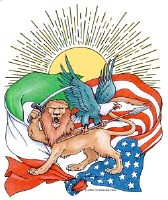
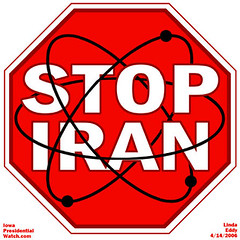

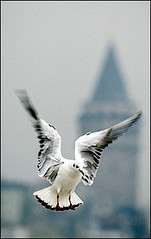



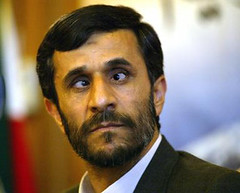

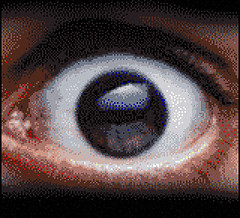

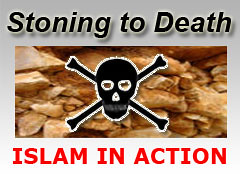

No comments:
Post a Comment